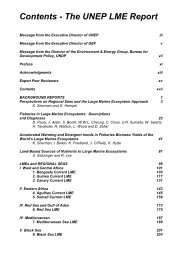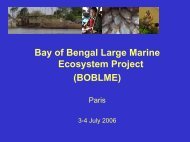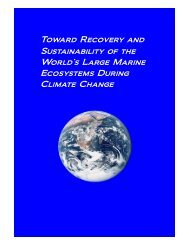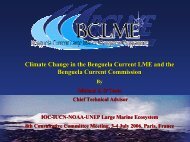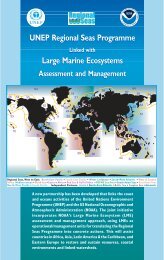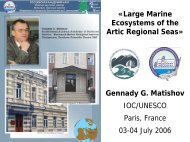Sustaining the World's Large Marine Ecosystems
Sustaining the World's Large Marine Ecosystems
Sustaining the World's Large Marine Ecosystems
Create successful ePaper yourself
Turn your PDF publications into a flip-book with our unique Google optimized e-Paper software.
Ocean Governance in <strong>the</strong><br />
Benguela <strong>Large</strong> <strong>Marine</strong> Ecosystem – Establishing<br />
<strong>the</strong> Benguela Current Commission<br />
Michael J. O’Toole<br />
<strong>Marine</strong> Institute<br />
Rinville, Oranmore, Co. Galway, Ireland<br />
The Benguela Current <strong>Large</strong> <strong>Marine</strong> Ecosystem (BCLME) project (2002-2008)<br />
was a joint initiative funded by <strong>the</strong> Global Environment Facility (GEF) and by <strong>the</strong><br />
governments of Angola, Namibia and South Africa to manage and utilise <strong>the</strong><br />
resources of <strong>the</strong> BCLME in a sustainable and integrated manner. It was designed<br />
to address transboundary problems, including <strong>the</strong> management and migration of<br />
valuable fish stocks across national boundaries, harmful algal blooms, alien<br />
invasive species and pollutants that can be advected by winds and currents from<br />
<strong>the</strong> waters off one country into <strong>the</strong> waters off ano<strong>the</strong>r. One of <strong>the</strong> major goals of<br />
<strong>the</strong> BCLME was to establish a Benguela Current Commission (BCC), which<br />
would enable <strong>the</strong> three countries to engage constructively and peacefully in<br />
resolving transboundary issues that threaten <strong>the</strong> integrity of <strong>the</strong> BCLME. It would<br />
also provide a framework to implement an ecosystem based management<br />
approach, increase <strong>the</strong> benefits derived from <strong>the</strong> management and harvesting of<br />
shared fish stocks, and improve <strong>the</strong> capacity and overall management of human<br />
impacts on <strong>the</strong> BCLME. This chapter briefly describes <strong>the</strong> BCLME project and<br />
<strong>the</strong> processes leading to <strong>the</strong> formation of <strong>the</strong> BCC, and summarises <strong>the</strong> present<br />
institutional structures, future plans and lessons learned from over a decade of<br />
development work in sou<strong>the</strong>rn Africa. The regional body is <strong>the</strong> first of its type in<br />
<strong>the</strong> world to be based on a <strong>Large</strong> <strong>Marine</strong> Ecosystem concept of ocean<br />
governance, and it will undergo fur<strong>the</strong>r evolution from this transitional phase into<br />
a fully developed, legally binding environmental Commission over <strong>the</strong> next five<br />
years.<br />
PROJECT DESCRIPTION<br />
The Benguela Current LME is one of <strong>the</strong> most productive upwelling regions of <strong>the</strong><br />
world (Figure 1). It supports an important global reservoir of biodiversity and<br />
biomass of zooplankton, fish, sea birds, and marine mammals, while nearshore<br />
and offshore sediments hold rich deposits of precious minerals (particularly<br />
diamonds), as well as oil and gas reserves.<br />
51



